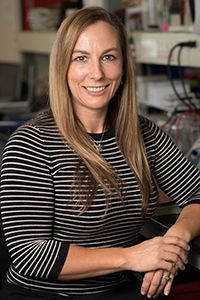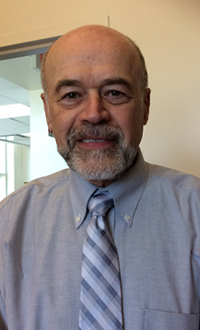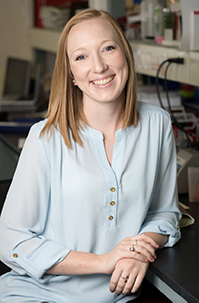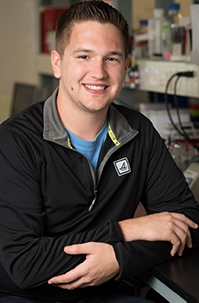 Michelle Kimple, PhD
Michelle Kimple, PhD
University of Wisconsin-Madison School of Medicine and Public Health
Michelle Kimple, PhD, is an Associate Professor of Medicine-Endocrinology and the Director of the Basic Science Selective at the University of Wisconsin-Madison. On January 1st, 2019, Michelle Kimple was nominated to serve on the editorial board of Diabetes. Also, in January 2019, a team she led successfully rolled out a new specialty-focused immersive basic science curriculum for advanced medical students at the UW SMPH called the Basic Science Selective.
Dr. Kimple leads a basic and translational research lab studying how the pancreatic beta-cell can be targeted to improve insulin secretion, beta-cell replication, and beta-cell survival in the context of the pathophysiological conditions of Type 1 and Type 2 Diabetes. Her work is focused on describing specific cellular signaling pathways that become dysfunctional in the context of hyperglycemia, dyslipidemia, and inflammation, with the long-term goal of therapeutically targeting these pathways.
Dr. Kimple has been a member of ASPET since 2008 and is a member of the Divisions for Drug Discovery and Development, Molecular Pharmacology, Pharmacology Education, and Translational and Clinical Pharmacology.
 David A. Gewirtz, PhD
David A. Gewirtz, PhD
Virginia Commonwealth University
David A. Gewirtz, PhD, is Professor of Pharmacology, Toxicology, and Medicine at Virginia Commonwealth University. Dr. Gewirtz was recently awarded a National Institutes of Health/National Cancer Institute 1R01CA239706-01 Grant for five years commencing on April 1, 2019. This multi-PI grant awarded to Dr. David A. Gewirtz, Dr. Joseph Landry, and Dr. Hisashi Harada provides each PI with $240,000 per annum toward direct costs for investigating the ability of senolytic agents to enhance the chemotherapeutic efficacy in lung cancer.
This collaborative project is designed to specifically address the problem of lung cancer recurrence by evaluating the capacity of senolytic agents to eradicate non-small cell lung cancer cells induced into senescence by chemotherapy and radiation. Furthermore, studies in both lung cancer cells and in tumor-bearing animals will also identify the contributions of the immune system to the effectiveness of this novel therapeutic strategy.
For the past 30 years, research in Dr. Gewirtz’s lab has been directed towards the areas of experimental chemotherapy and radiotherapy in cancer, with a primary focus on breast cancer and lung cancer. Dr. Gewirtz’s notable contributions to the oncology field, among others, include the identification of cytostatic, cytotoxic, and nonprotective functions of autophagy in both lung and breast cancer cells.
Dr. Gewirtz has been a member of ASPET since 1986 and is a member of the Divisions for Cancer Pharmacology and Molecular Pharmacology.
 Rachel Fenske, PhD
Rachel Fenske, PhD
University of Wisconsin-Madison
Rachel Fenske, PhD, graduated from the University of Wisconsin-Madison in May 2019, with a PhD in Nutritional Sciences and a Certificate in Dietetics. In April 2019, Dr. Fenske received word that she matched into the UW-Health Dietetic Internship Program and will begin this next step in her training in June 2019.
Dr. Fenske was a graduate student in Dr. Michelle Kimple’s laboratory at the UW-Madison and studied the role of inhibitory G protein signaling on the beta-cell pathophysiology of type 1 diabetes, and how these pathways might be targeted pharmaceutically or through dietary interventions. Dr. Fenske aspires to a clinical faculty career as an RD/PhD, where she would work with individuals with type 1 diabetes and be actively involved in clinical research, teaching, and outreach.
Dr. Fenske has been a member of ASPET since 2016 and is a member of the Divisions for Molecular Pharmacology and Translational and Clinical Pharmacology.
 Austin Reuter, BS
Austin Reuter, BS
University of Wisconsin-Madison
Austin Reuter, BS, graduated in May 2019, with an MS degree in Counseling from UW-Whitewater and will complete a Research Internship in Medicine in Summer, 2019, from the UW-Madison. Recently, Mr. Reuter received word that he was accepted into the University of Minnesota School of Pharmacy PharmD program (Class of 2022).
Mr. Reuter is a post-baccalaureate Research Intern in Dr. Michelle Kimple’s laboratory at the UW-Madison studying and validating inhibitory G protein signaling pathways in the beta-cell that could serve as novel pharmaceutical targets to improve beta-cell function and mass in type 2 diabetes. While working in Dr. Michelle Kimple’s laboratory, Mr. Reuter also completed an MS in counseling at the UW-Whitewater. Mr. Reuter aspires to a career as a pharmacist and hopes to work with students interested in pursuing STEM careers.
Mr. Reuter has been a member of ASPET since 2017 and is a member of the Divisions for Molecular Pharmacology and Translational and Clinical Pharmacology.